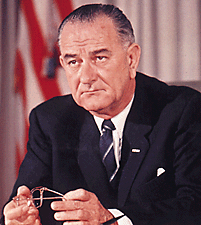Summit Celebrates the 50th Anniversary of the Civil Rights Act of 1964
Friday, April 11th, 2014April 11, 2014
At a summit celebrating the 50th anniversary of the historic Civil Rights Act of 1964, United States President Barack Obama praised President Lyndon Baines Johnson for “opening new doors of opportunity and education” for him and millions of other Americans. Johnson “knew that he had a unique capacity as the most powerful white politician from the South to not merely challenge the convention that had crushed the dreams of so many but to ultimately dismantle for good the structures of legal segregation,” President Obama said. The summit was held in Austin, Texas, at the LBJ Presidential Library and Museum. Johnson, who served as president from 1963 to 1969, signed the landmark measure on July 2, 1964, the day it was finally passed by Congress. The law was a major accomplishment of the civil rights movement, the main domestic issue in the United States in the 1950′s and 1960′s. Other speakers at the summit included former Presidents Jimmy Carter, Bill Clinton, and George W. Bush.

Lyndon Baines Johnson (AP/Wide World)
One of the nation’s strongest civil rights laws, the Civil Rights Act of 1964 was passed to address the widespread political, economic, and educational oppression of African Americans and other minority groups. Beginning in the late 1800′s, blacks in the South increasingly suffered from segregation, the loss of voting rights, and other forms of discrimination. These practices were designed to keep the vast majority of African Americans in the South in a form of slavery known as peonage. This was especially true of blacks who worked as sharecroppers. The Civil Rights Act of 1964 transformed American society by banning discrimination because of a person’s color, race, national origin, religion, or sex. It opened to all Americans hotels, motels, restaurants, and other businesses that serve the public. At that time, many businesses, especially in the South, refused to serve blacks.
The 1964 Civil Rights Act also outlawed discrimination against minority voters, which included numerous state and local laws as well as violent intimidation, and guaranteed equal job opportunities for all. Johnson, a former U.S. senator skilled in dealing with legislators, pushed the law through Congress, overcoming fierce opposition by some members.
Additional World Book articles:
- Jim Crow
- Martin Luther King, Jr.
- Voting Rights Act of 1965
- Civil rights (1964) (a Back in Time article)



